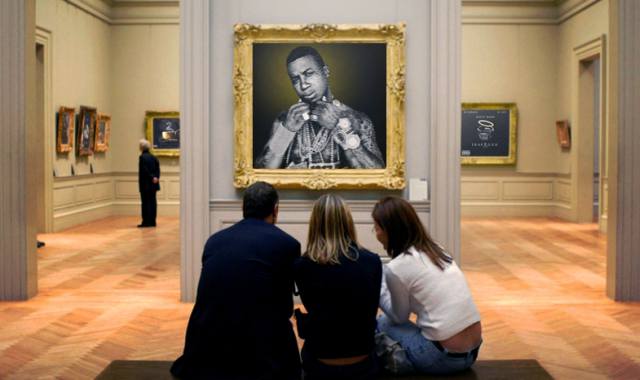DO YOU AGREE ?
NOISEY ATLANTA PLUS
By David Drake

Though he sits behind bars, Gucci Mane is all around us. He is the most influential underground rapper of the past decade, if not the most influential rapper point blank. Intentional or incidental, Gucci Mane’s virtual exclusion from last year’s VH1 documentary on Atlanta hip-hop is telling. That such a major actor was relegated to a footnote suggests his place in history remains contested. More damning—at least to the overlords who write popular music’s most prominent stories—was his inability to sustain crossover success in the vein of Lil Wayne, Jay Z, or Drake, proof-positive of his marginal status. In the 1990s, platinum album sales empowered gangster rap both within and outside the mainstream. But by the late 2000s, just as internet piracy was reaching its peak, the very real enthusiasm for Gucci’s work was much more ephemeral to measure—and easier to deny.
Not that history’s ever a settled question, but Gucci’s position feels especially precarious. Of course, there are concrete reasons his music is so divisive. His catalog contains its fair share of misogyny. It also carries all the di rigeur trappings—cliches, to some, formal characteristics, to others—of pulp street rap, a genre often documented more by enthusiasts than historians (if academics deign to investigate the form, it’s seldom as a space for discrete art objects, tending more towards pathologizing of artists and fans—hip-hop as a source or consequence of cultural disfunction). At the same time, the case for his art can be just as uncritical: Celebrated as a wacky, colorful character, or as a one-dimensional deviation from the street rap mean, he’s rendered superficially, his work illegible—a stand-in for “ratchet” culture, as in 2013’s Spring Breakers.
This trash-culture irreverence is something Gucci actively courts, and he’s not always wrong to do so—nothing sinks enthusiasm so swiftly as the grim obligations of seriousness. Yet ten years after the release of Trap House, his influence has penetrated much more deeply than any of his relevant peers. Hip-hop throughout the South and post-industrial Midwest is inundated with both amateur and professional Gucci disciples—an aesthetic diaspora an acquaintance labelled the “Sunz of Mane.” Young Jeezy, with a comparable level of success, had a much shallower bag of tricks; a kid might be inspired by his success, or learn from his experiences, but his music’s surface offers much less to emulate. Gucci’s work was populated with a surplus of ideas, from adlibs to concepts to diction, a teeming marketplace of innovations. There are no Mike Wills or Waka Flockas—artists who came up directly under Gucci’s tutelage—on Jeezy’s resume. Nor has Jeezy inspired a new generation of stars, as Gucci’s aesthetic so directly predicted the Migos and Chief Keef. And no one from CTE has risen quite as quickly as Young Thug after his time spent under Gucci’s wing.
Thug belongs much more directly to Lil Wayne’s lineage than Gucci’s, but it’s unsurprising that Gucci was the first to reach out. Those two stars represented the twin aesthetic poles of street rap in the late ’00s. Listening to Lil Wayne was an experience of exceptionalism: the point where effortless wordplay reached its unattainable peak. By definition, there could be only one Wayne. He was a prodigal craftsman, one for whom no ideology would ever trump the art of potent wordplay, imagery, or fourth wall-breaking. Whether it was sexual or scatalogical, no joke was too low brow that it couldn’t be elevated, conveyed in the most clever, unpredictable manner. His transition to mass popularity required underlining this part of his appeal: At its center, his art was about excellence. And so his delivery slowed as he drew attention to these tricks. (This reached a parodic outer limit with the arrival of Young Money and the cartoonish hashtag punchline style in 2009.)
Gucci, meanwhile, operated as his inverse, consistently downplaying any suggestion that he was a ‘lyrical’ rapper: “‘Damn, Gucci lyrical!’ Naw, I ain’t lyrical/ But my bracelet is crazy, but my necklace is hysterical.” For a rap artist who declined the “lyrical” tag, Gucci was one of hip-hop’s most dexterous, vivid, and imaginative writers. This seeming contradiction suggests not so much a qualitative divide between Gucci and Wayne as an ideological one. To Gucci, aesthetics were as much about his relationship to his audience as they were a self-contained goal, a way to connect as opposed to a way to transcend. Perhaps this approach can be traced back to an interview he gave to Murder Dog magazine in the mid 2000s, after the success of “Icy.” Born in Bessemer, Alabama and raised in Birmingham, Gucci moved to Atlanta at nine years of age. “The shit is so fast, I adapt so quick,” Gucci says of Atlanta. “I’m going to school up here on the east side of town. I blend all the shit I see up here with the way I talk and people just dig the shit. That’s my style and back, just that quick. It’s just like a country boy and a city boy all blended into one.”
Aesthetically, this explains Gucci’s mumbled backwoods delivery and his fast life aspirations. But it’s about something deeper as well. The country boy isn’t unintelligent; he’s unsophisticated, a person humbly unfamiliar with the structures and grammar of institutional power. For a quick country kid adapting to the labyrinthine pathways of the music industry, lyricism is not an end in and of itself, but a tactic for holding the attention of an audience with an unquenchable thirst for new material. At his peak (roughly 2007-2010), every verse was undeniable, the must-hear moment in every song in which he appeared. (This tradition was in many ways more inspired by Bun B’s furious guest run in 2004 than Wayne’s prolific mixtape output—more writerly, less stylistically eccentric: “UGK my favorite group for years been rockin’ with them guys.”)
